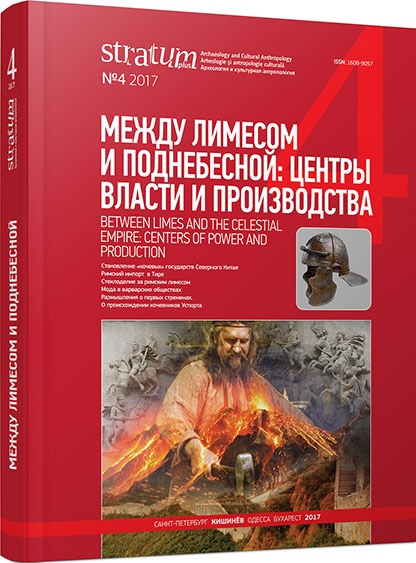Типология погребальных комплексов могильника Казыбаба I во II—IV вв. н. э. (к вопросу о происхождении кочевников юго-восточного чинка Устюрта)
The Typology of Funerary Complexes of the Kazybaba I Cemetery in 2nd — 4th Centuries AD (on the origins of the nomads of the Ustyurt south-east edges)
Author(s): Vadim N. Yagodin, Egor P. Kitov, Vadim V. YagodinSubject(s): History, Archaeology, Cultural history, Ancient World, Cultural Anthropology / Ethnology, Migration Studies
Published by: Издательский дом Stratum, Университет «Высшая антропологическая школа»
Keywords: Ustyurt; ancient Khwarezm; Late Sarmatian period; early nomads; funerary structures
Summary/Abstract: In the 1980s—1990s, a group headed by Vadim Yagodin studied a group of cemeteries belonging to the early nomads on the Ustyurt territory. Kazybaba I cemetery is one of the most representative ones and consists of seven kurgan groups. A complex study of all the kurgans allowed us to identify a group of 81 conventional units of funerary structures of the Late Sarmatian Period as opposed to the previous period. Five types of burial complexes were defined based on these units. The results of analysis suggest that the nomads appeared at the Ustyurt south-east edges as a consequence of more active connections between the population of the forest and forest-steppe zones of Volga-Ural Region and their movement southbound along the ancient migratory ways, leading to the oriental civilizations of Khwarezm and Parthia. Their graduate settlement at the North-Western boundaries of the settled and agricultural Khwarezm exposed the nomads to the ideological influence of Zoroastrianism, which resulted in the steady decline and transformation of the pagan funerary ritualism characteristic to the nomads of the 2nd — 4th centuries.
Journal: Stratum plus. Археология и культурная антропология
- Issue Year: 2017
- Issue No: 4
- Page Range: 357-379
- Page Count: 23
- Language: Russian
- Content File-PDF

